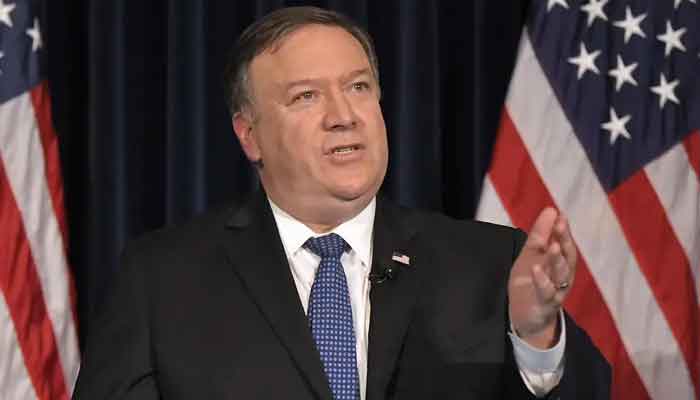China’s treatment of its Muslims ‘enormous human rights violation’, says Pompeo
China’s treatment of its Muslims ‘enormous human rights violation’, says Pompeo
WASHINGTON: US Secretary of State Mike Pompeo has said that China’s treatment of Muslims, including the Uighurs, in western China was an “enormous human rights violation” and Washington will continue to raise the issue, a British wire service reported on Thursday.
More: US curbs visas of Chinese officials, demands end to Uighur repression
“This is not only an enormous human rights violation, but we don’t think it’s in the best interests of the world or of China to engage in this kind of behavior,” Pompeo said in a television interview with American broadcaster PBS.
Asked whether Chinese President Xi Jinping was responsible, Pompeo said: “Xi Jinping leads the country just like the leader of a tank platoon, a small business or a country is responsible for the things that happen in your name.”
Punishing Beijing for its treatment of Muslim minorities, the US government this week widened its trade blacklist to include some of China’s top artificial intelligence startups and announced visa restrictions on Chinese government and Communist Party officials it believes responsible for the detention or abuse of Muslim minorities in Xinjiang province.
Pompeo on Sunday called on all countries to resist China’s demands to repatriate ethnic Uighurs, saying Beijing’s campaign in the western Chinese region of Xinjiang was an “attempt to erase its own citizens.”
UN experts and activists say at least one million Uighurs, and members of other largely Muslim minority groups, have been detained in camps in the remote region. China has denied any mistreatment of Uighurs, and said Xinjiang was its internal affair.
“Recently, the US side has been attacking and smearing China’s Xinjiang policies on the pretense of religion and human rights, and making baseless and mistaken remarks that are contrary to the facts,” Chinese foreign ministry spokesman Geng Shuang told reporters during a daily briefing in Beijing. “China expresses strong dissatisfaction and firm opposition to this.
-
 Benny Blanco Explains Why His Feet Were Dirty During Podcast Debut
Benny Blanco Explains Why His Feet Were Dirty During Podcast Debut -
 Jake Humphrey Shares The Powerful Meaning Behind His Wrist Tattoo
Jake Humphrey Shares The Powerful Meaning Behind His Wrist Tattoo -
 Matthew Lillard Weighs In On His Return To The 'Scream' Franchise After Decades Of Persistence
Matthew Lillard Weighs In On His Return To The 'Scream' Franchise After Decades Of Persistence -
 Travis, Jason Kelce Share Blunt Dating Advice For Men: 'She's Gonna Hate You'
Travis, Jason Kelce Share Blunt Dating Advice For Men: 'She's Gonna Hate You' -
 Australia To Launch First High-speed Bullet Train After 50-years Delay
Australia To Launch First High-speed Bullet Train After 50-years Delay -
 Meghan Markle Turns To Desperate Bids & Her Kids Are Her ‘saving Grace’: Here’s What They’ll Do
Meghan Markle Turns To Desperate Bids & Her Kids Are Her ‘saving Grace’: Here’s What They’ll Do -
 King Charles Gives A Nod To Sister Anne's Latest Royal Visit
King Charles Gives A Nod To Sister Anne's Latest Royal Visit -
 Christian Bale Shares Rare Views On Celebrity Culture Urging Fans Not To Meet Him In Person
Christian Bale Shares Rare Views On Celebrity Culture Urging Fans Not To Meet Him In Person -
 Ariana Grande To Skip Actor Awards Despite Major Nomination
Ariana Grande To Skip Actor Awards Despite Major Nomination -
 North Carolina Teen Accused Of Killing Sister, Injuring Brother In Deadly Attack
North Carolina Teen Accused Of Killing Sister, Injuring Brother In Deadly Attack -
 Ryan Gosling Releases Witty 'Project Hail Mary' Ad With Sweet Reference To Eva Mendes
Ryan Gosling Releases Witty 'Project Hail Mary' Ad With Sweet Reference To Eva Mendes -
 Teyana Taylor Reveals What Lured Her Back To Music After Earning Fame In Acting Industry
Teyana Taylor Reveals What Lured Her Back To Music After Earning Fame In Acting Industry -
 Prince William Shows He's Ready To Lead The Monarchy Amid Andrew Scandal
Prince William Shows He's Ready To Lead The Monarchy Amid Andrew Scandal -
 Lux Pascal Gushes Over Role In Tom Ford's 'Cry To Heaven': 'I Just Wanted To Be Part Of This Picture'
Lux Pascal Gushes Over Role In Tom Ford's 'Cry To Heaven': 'I Just Wanted To Be Part Of This Picture' -
 Near-blind Refugee Found Dead In Buffalo After Release By US Border Patrol
Near-blind Refugee Found Dead In Buffalo After Release By US Border Patrol -
 Firm Steps In Forcing Andrew’s Hand: ‘Can No Longer Keep A Promise'
Firm Steps In Forcing Andrew’s Hand: ‘Can No Longer Keep A Promise'




